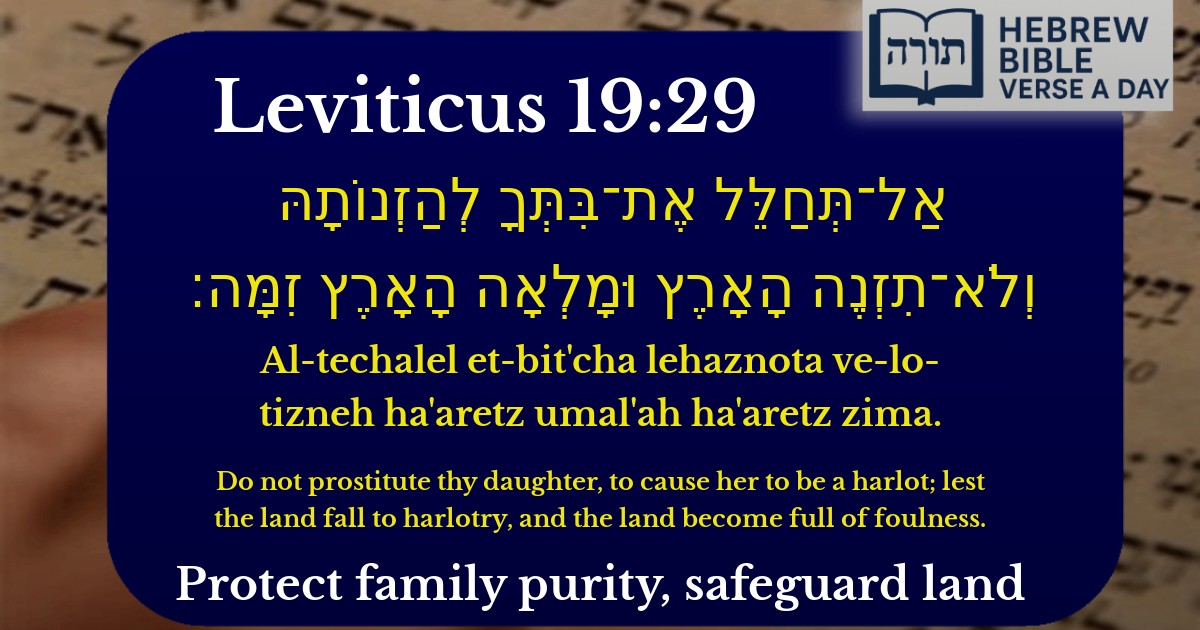Frequently Asked Questions
Q: What does Leviticus 19:29 mean?
A: Leviticus 19:29 warns against allowing one's daughter to engage in immoral behavior, specifically prostitution, as it leads to moral corruption in society. The verse emphasizes that such actions defile the land and bring about spiritual impurity. Rashi explains that this prohibition extends to any form of enabling immoral behavior, as it harms both the individual and the community.
Q: Why is this verse important in Judaism?
A: This verse is important because it highlights the Torah's emphasis on maintaining moral purity and safeguarding the sanctity of family and society. The Rambam (Maimonides) includes this prohibition in his list of commandments (Sefer HaMitzvot), showing its significance in Jewish law. The Talmud (Sanhedrin 76a) also discusses the broader implications of protecting one's children from negative influences.
Q: What lesson can we learn from Leviticus 19:29 today?
A: The verse teaches the responsibility parents have in guiding their children toward moral and ethical behavior. The Midrash (Sifra) connects this to the idea that a parent’s role includes setting boundaries to prevent moral decay. In modern times, this applies to protecting children from harmful environments and influences that could lead them astray from Torah values.
Q: How does this verse apply to broader societal issues?
A: The verse warns that individual sins, like immorality, can spread and corrupt an entire society ('lest the land fall to harlotry'). The Talmud (Ketubot 13b) discusses how public morality affects the spiritual state of a community. This teaches that upholding Torah values safeguards society from moral decline.
Q: Does this verse only apply to daughters?
A: While the verse specifically mentions daughters, Jewish tradition (as explained by Rashi and Rambam) extends the principle to all children. The Talmud (Kiddushin 41a) discusses parental responsibility in general, teaching that parents must protect both sons and daughters from influences that could lead them to sin.


Prohibition Against Profaning One's Daughter
The verse (Vayikra 19:29) prohibits a father from allowing his daughter to engage in immoral behavior, specifically הזנות (harlotry). Rashi explains that this refers to a father who permits his daughter to engage in promiscuity without formal marriage, thereby profaning her sanctity. The Rambam (Hilchos Ishut 1:4) further clarifies that this includes any arrangement where a woman is treated as a concubine rather than entering a proper marital covenant (kiddushin).
Moral Consequences for the Land
The second half of the verse warns that such behavior leads to the land itself becoming morally corrupt (וּמָלְאָה הָאָרֶץ זִמָּה). The Sifra (Kedoshim 7:9) connects this to the idea that sexual immorality defiles the land, leading to exile—a theme echoed in Vayikra 18:28 regarding the sins of the Canaanites. The Talmud (Shabbat 33a) teaches that immoral behavior undermines societal stability, causing divine displeasure and eventual expulsion from the land.
Broader Halachic Implications